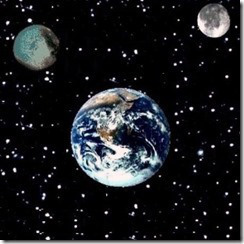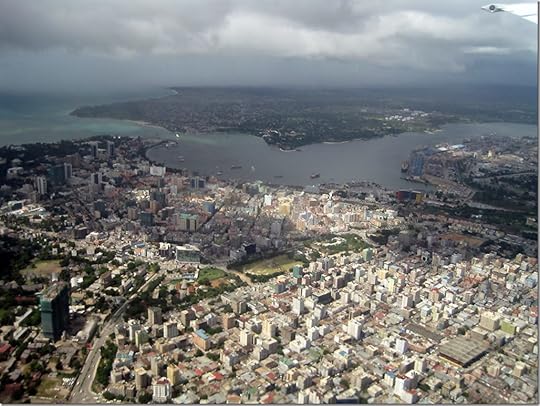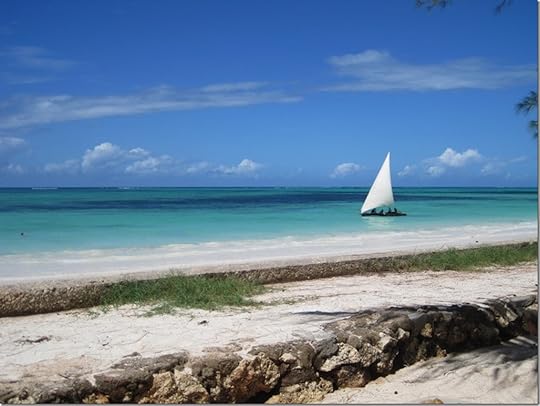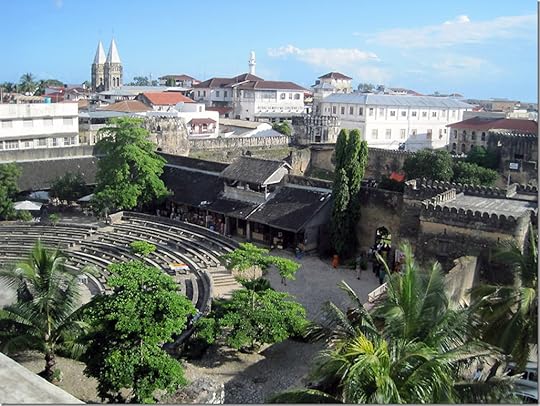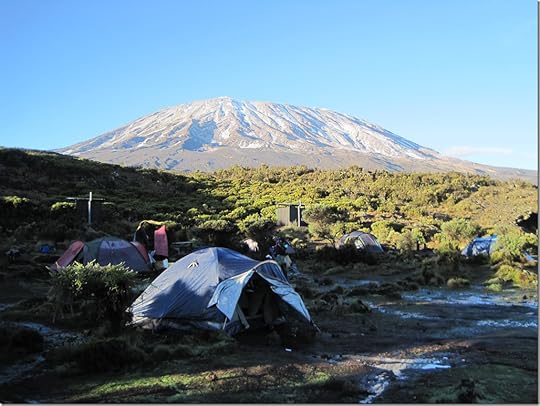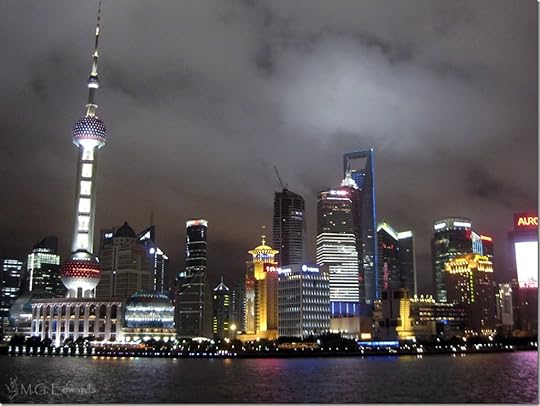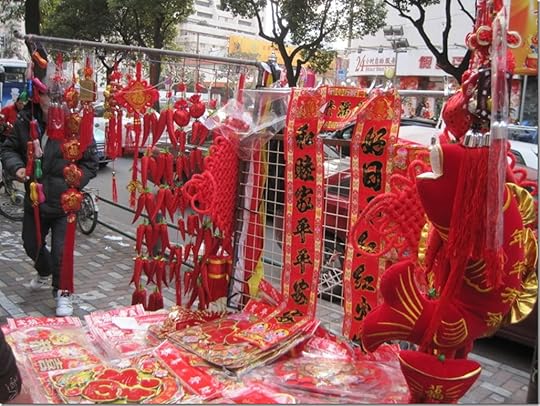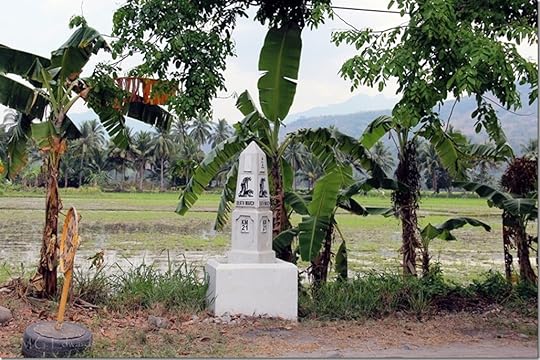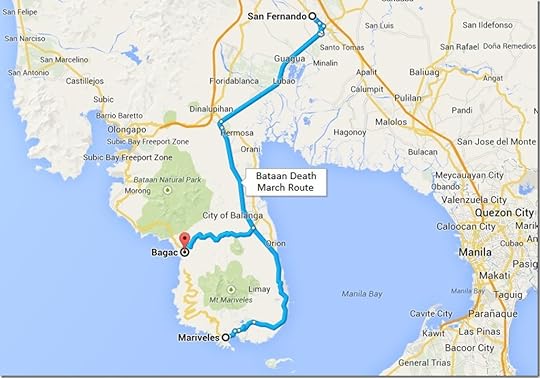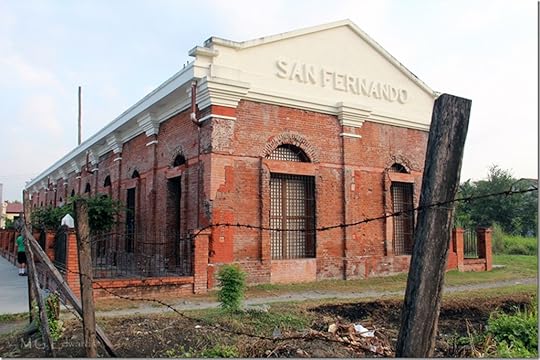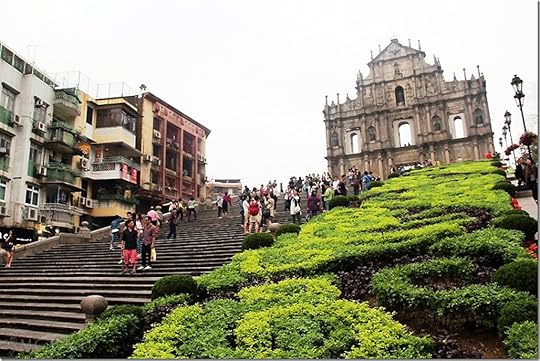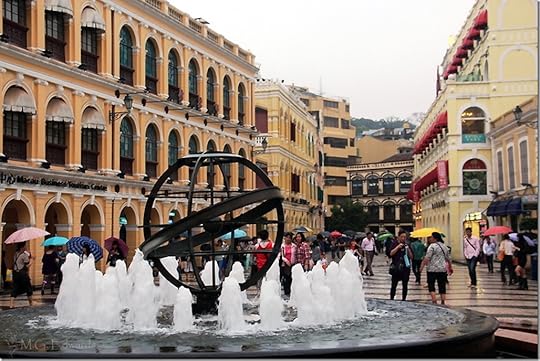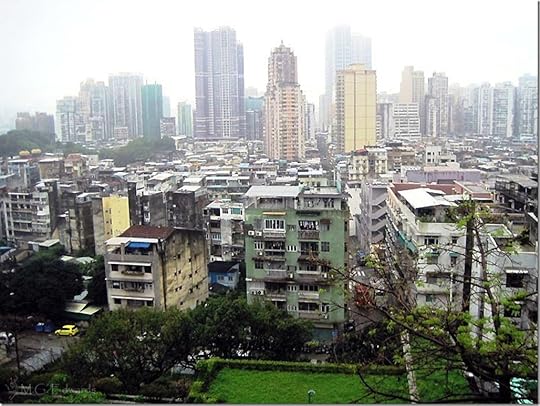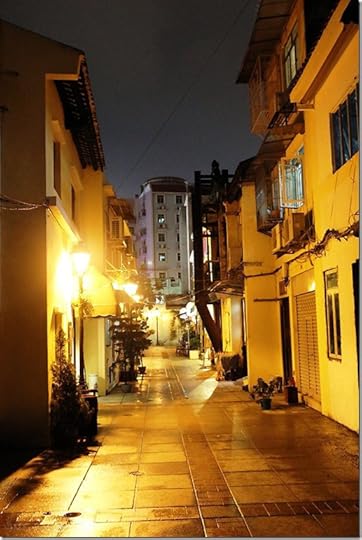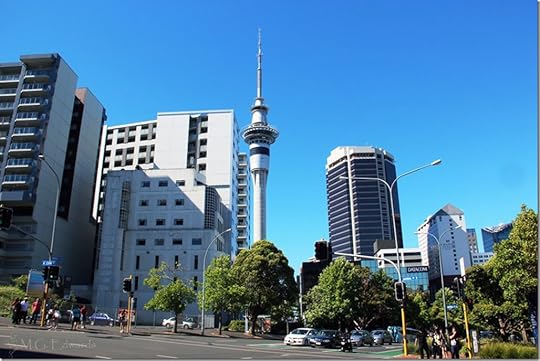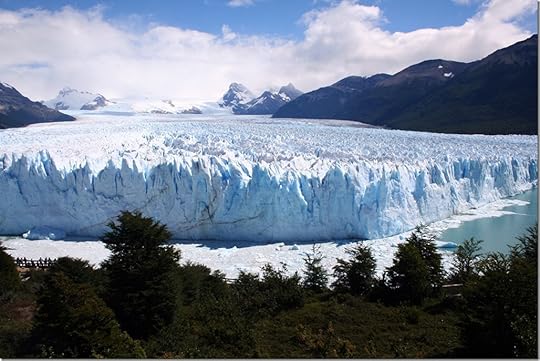M.G. Edwards's Blog, page 2
June 13, 2014
Thoughts & Sayings (June 2014)
Here are some thoughts and sayings I posted on Twitter and/or Facebook in April and May. To my knowledge, I made these up (for better or for worse). Sit back, relax, and enjoy the write!
Encouraging Words
1. Question this.
2. Live it up but let it down slowly.
3. It isn’t the end of the world, but avoid it like the plague.
Twisted Words
4. This restaurant is notable. I can never get a reservation.
5. If nobody’s perfect, I must be a nobody.
Random Musings
6. Why can’t I move as fast as my brain?
7. It’s never dangerous until it is.
8. Why do people care if chickens cross the road?
9. Every day, millions of people have their cake and eat it.
Click here to visit the Thoughts & Sayings page, or click here to read the previous batch of Thoughts & Sayings.
Filed under: Thoughts & Sayings Tagged: accident, amwriting, apocalypse, apocalyptic humor, April, April sayings, avoid like the plague, baking humor, booked, brain, brain power, brainwashing, cake, cake and eat it, chicken cross road, chicken humor, chicken joke, conceit, danger, dangerous, dining, dining humor, disaster, disaster humor, drinking, drinking humor, Encouraging Words, end of the world, Events, exclusive restaurant, Facebook, freethinking humor, fully booked, Hangover, have it all, holiday sayings, Holidays, Holidays and Events, Humor, I am perfect, In Its Own Write, independent thought, irony, jokes, June, June Sayings, letdown, live it up, marie antoinette, May, May Sayings, memes, Month, monthly sayings, narcissism, narcissist, no table, nobody's perfect, notable restaurant, party, partying, partying humor, Perfection, plague, political humor, propaganda, psychological humor, questioning, quotes, Random Musings, reaction, reservation, Restaurant, restaurant humor, risk, risk taking, satire, Sayings, slogans, slow moving, table reservation, thinking, thought of the day, Thoughts, Twisted Words, Twitter, witty quotes








May 21, 2014
Verda
“Verda” is one of the stories in Real Dreams: Thirty Years of Short Stories. It is also available to read on Wattpad. Visit www.mgedwards.com for more books, stories, and travelogues from author M.G. Edwards.
She rises in the evening sky like a beautiful green gem glowing in the early twilight. Watching over the earth, she bathes it in verdant light at the end of each day. She lies closer to our world than her barren twin, Luna, who shines brighter when the twilight turns to night. She is Verda, the green-tinged moon that orbits the earth. Also known as "Earth’s Sister," the small moon has long been an object of human obsession. For millennia, people have gazed up at her and wondered what secrets she has hidden in her veiled green atmosphere. It was not until the late twentieth century at the dawn of the Space Age, however, that many of her secrets were revealed.
Visit MG Edwards or Wattpad to read more of “Verda.”
© 2014 Brilliance Press. All rights reserved. No part of this work may be reproduced or transmitted without the written consent of the author. This is a work of fiction. Names, characters, businesses, places, events and incidents are either the products of the author’s imagination or used in a fictitious manner. Any resemblance to actual persons, living or dead, or actual events is purely coincidental. Cover photo licensed from iiuri courtesy of Shutterstock.
Filed under: Books, Real Dreams, Verda Tagged: Adelfigea, Age of Exploration, Aliens, Amazon, amwriting, Android, Antarctica Treaty System, Apple, Artemis, Artemis Camp, Artemis Command Center, astronauts, Athena, Baker & Taylor, Bangkok, Barnes & Noble, Blio, Book, Brezhnevskaya, Camp Council, Christian symbolism, Cold War, Cold War space, Colombia, Copernicus, Createspace, Diesel Bookstore, E-book, Edwards Air Force Base, Energia, environmental preservation, Facebook, Faith, Fantasy, fictional moon, Gaea, Gaea rockets, Galileo, Giovanni Schiaparelli, Goodreads, Google Play, gravity, gravity pull, Greek mythology, Green Room, habitable planet, homebrew, Houston Space Center, Indie Author, IndieBound, Inspiration, Inspirational, iPad, iPhone, ITunes, Johannes Hevelius map, Kindle, Kobo Books, Kurosawa, Kyoto Protocol, Landing Day, Life, manned space flight, Mars colonization, Mars exploration, Mikhail Gorbachev, Military, NASA, National Advisory Committee for Aeronautics, National Aeronautics and Space Administration, Nirvana, Non-Fiction, other planets, other worlds, Oyster Books, peet, Percival Lowell, Ptolemy, Real Dreams, Ronald Reagan, Science Fiction, Scribd, Selenographia, Short Stories, Shuttle Atlantis, Shuttle Challenger, Shuttle Constitution, Shuttle Discovery, Shuttle Endeavor, Shuttle Enterprise, Shuttle Liberty, Shuttle Monitor, Smashwords, Soviet Union, Space, Space Age, space exploitation, space exploration, space mission, space quarantine, space shuttle, space trauma, stories, Strategic Agreement on Verdan Development, surface temperature, survival on another planet, surviving in space, Tall Tales, ufo, United States, Verda, Verda Treaty System, Versta, World War II








May 18, 2014
Real Dreams: Thirty Years of Short Stories
A French prisoner struggles to survive in a Nazi concentration camp during World War II. A delinquent youth is obsessed with a cemetery ghost. Good and evil fight over the soul of a zombie. A grandmother thought to suffer from mental illness predicts the future. Car trouble leads to an encounter with an angel. A chief must calm a volcano before it destroys his village. A human tries to dissuade elves and dwarves from going to war. A bride confronts deception in an effort to reunite with her bridegroom. A boy encounters superhuman army ants that escape from a military laboratory and move into his bedroom closet.
These stories and more are featured in Real Dreams: Thirty Years of Short Stories, a collection of 15 short stories I wrote between 1981 and 2011.
Each story reflects changes in my writing style and interests over time. I wrote the earliest story, How Little Big Chief Calmed the Mountain, in 1981 at the age of ten, and the latest, Evil | Live, thirty years later. The stories are grouped by genre to help the reader identify each style. They feature some common themes, including hope, dreams, light, darkness, perseverance, and spirituality, wrapped up in some novel ideas. Enjoy these diverse and timeless works three decades in the making.
Story Synopses
Vichy (1990) tells the story of Jean-Marie Daubert, a spy for the French Resistance during World War II who was captured and sent to Gross-Rosen concentration camp in Poland (then Silesia). It’s a sobering story of love and loss told through letters from Daubert to his wife Corinne.
The Ballick Eye (1988) is a ghost story about a delinquent youth sent by his parents to live with an aunt who is determined to straighten him out. Can a cemetery ghost turn his life around?
Evil | Live (2011) is a twist on the traditional horror story. Good and evil engage in an epic struggle for the soul of a zombie.
The Grandma Conspiracy (2004) tells the story of an elderly woman with the ability to predict the future whose family believes she suffers from mental illness. The story is narrated by one of her grandchildren who struggles to help her.
Room G-13 (1993) is a horror story with a twist. Strange sounds emanate from the maintenance man’s room at a college dormitory, leading one student to investigate what’s really going happening there.
The Factory Worker in the Corner Office (2007) is an allegory about a white-collar worker who deals with a difficult boss.
Saved by Hope (1988) is a true story based on an encounter I had with an angel during the summer of 1987.
Mysterius, Lord of the Unknown (1987) tells the tale of the Greek god of the unknown. The ancient Greeks dedicated some temple altars to an unknown god. Mysterius is an interpretation of this deity.
How Little Big Chief Calmed the Mountain (1981) is an allegory inspired by the May 1981 eruption of Mt. St. Helens. A village leader must appease an angry volcano before it erupts and destroys his village.
The Emissary’s Battle (2005) is a story set in a fantasy world. A human envoy must use diplomacy to diffuse a conflict between elves and dwarves before it leads to war.
Kirche and the Mirror (1992) is a religious allegory. On the day her bridegroom returns, the bride must confront deception and illusions before reuniting with him.
Suits (1989) is a science fiction short with an ironic twist. A child dreams of an alien invasion.
Verda (1997) ponders the existence of a second moon orbiting Earth capable of sustaining life and humanity’s efforts to colonize it. The story explores themes ranging from space exploration to environmental preservation.
G.I. Ants (1983) is a story about a boy’s encounter with a group of superhuman army ants who escape from a military laboratory and move into his closet.
High Flying Deutschman (1988) tells the story of a German exchange student’s quest to learn baseball and join a championship high school team.
Real Dreams is available in e-book format for only $2.99 (or equivalent in local currencies) at:
Amazon (Kindle)
Apple iTunes (iPad/iPhone)
Barnes & Noble (Nook)
Baker & Taylor (Blio)
Goodreads
Google Play (Android)
Inktera (Android)
Kobo Books
Oyster Books
Powell’s Books
Scribd
Smashwords
Real Dreams is available in print for just $8.99 (or equivalent in local currencies) at:
Amazon
Createspace
More About Real Dreams
Real Dreams
Real Dreams Featured in the Foreign Service Journal
Real Dreams Now Available in Print
Filed under: Books, Real Dreams Tagged: Aliens, allegory of the church, Alzheimer’s, Amazon, American Legion baseball, amwriting, Android, ant invasion, anthology, Apollo, Apple, assembly line, Baker & Taylor, Bangkok, Barnes & Noble, baseball, Blio, Book, Christian, church bride story, church bridegroom, college dormitory, college horror story, college residence hall, concentration camp, corner office, Createspace, Darkness, dementia, Diesel Bookstore, Dreams, dwarves, E-book, elderly, elves, encounter with an angel, environmental preservation, espionage, Evil, Facebook, factory worker, Faith, Fantasy, fictional moon, foreign students playing baseball, France, French resistance, Germany, Ghost, good, Goodreads, Google Play, Greek god of the unknown, Hades, History, hope, horror story, human invasion of Mars, Indie Author, IndieBound, Inspiration, Inspirational, iPad, iPhone, ITunes, Kindle, Kobo Books, Legends, Life, Light, Mars colonization, Mars exploration, Mental Illness, Military, military laboratory, Mt. St. Helens, Mt. St. Helens story, mysterious god, Mythology, Nazis, Non-Fiction, nonfiction, Oyster Books, pioneer ghosts, pioneers, predicting the future, prescience, Real Dreams, saved by an angel, Scribd, Short Stories, short story anthology, Short Story Collection, smart ants, Smashwords, Space, space exploration, Spirituality, stories, strong ants, superhuman ants, superhuman army ants, survival on another planet, surviving in space, Suspense, Tall Tales, three decades of stories, university horror story, unknown Greek god, village leader, volcano, War, white-collar worker, World War II, World War II espionage, World War II spy, Young Adult, Zeus, zombie turns good, zombies








May 14, 2014
Tanzania
Click here to read the original article on MG Edwards. Visit MG Edwards for more great travelogues, photos, and videos from around the world.
Tanzania invites visitors to explore its scenic beauty. From the freestanding Afromontane peaks that rise to the summit of one of Africa’s most iconic landmarks, Mount Kilimanjaro, to the wild safari adventures in Ngorongoro Crater and on the Serengeti, strolls on the white sand beaches of Zanzibar, the shores of Lake Tanganyika, and everything in between — Tanzania is a wonderland. It is easy to see why it is one of the Africa’s most popular travel destinations. Formed in 1964 from the union of the newly independent republics of Tanganyika and Zanzibar, Tanzania is a stable, developing country that embodies the best of Africa and its challenges. Its colorful history reflects the influence of indigenous tribes as well as rule by Germany, Great Britain. and an Arab sultanate with historic ties to Oman. This mix of cultures has given Tanzania a diverse character all its own. The Bantu language Swahili (Kiswahili) filled with Arabic phrases, mountaineers who come from around the world to climb Kilimanjaro with the help of local guides and porters, and German bakeries found in the unlikeliest of places will remind you that Tanzania is a place like none other. Not even a mere “hello” will suffice. Your Swahili greeting “jambo” may very well be a “hujambo” or “sijambo” depending on whether you’re coming or going.
More About Tanzania
The Snows of Kilimanjaro
The Glaciers of Kilimanjaro
Kilimanjaro Sign – Old and New
The Porters of Kilimanjaro
The Plant Life of Kilimanjaro
The Majesty of Kilimanjaro
The Routes of Kilimanjaro
Outtake Photos from Kilimanjaro
Aerial View of Dar Es Salaam
The Indian Ocean from Zanzibar
A View of Stone Town on Zanzibar
Mount Kilimanjaro
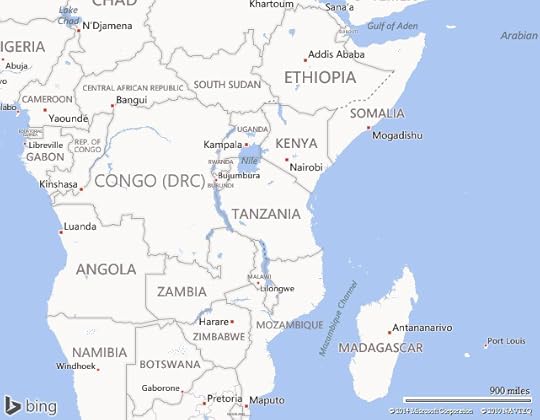
Filed under: Africa, Tanzania Tagged: Africa, Africa Great Lake, Afromontane, Arabic, Bantu, British colony, British Tanzania, climb Kilimanjaro, Dar Es Salaam, East Africa, German colony, German Tanzania, hujambo, Indian Ocean, jambo, Kilimanjaro, Kilimanjaro Summit, Kiswahili, Mountaineering, Ngorongoro, safari adventure, Serengeti, sijambo, Swahili, Tanganyika, Tanzania, Tanzania 1964, Tanzania bakeries, Tanzania colony, Tanzania photos, Tanzania safari, Tanzania travel, Travel, Zanzibar, Zanzibar sultan, Zanzibar sultanate








May 11, 2014
China
Click here to read the original article on MG Edwards. Visit MG Edwards for more great travelogues, photos, and videos from around the world.
How does one describe a country like China? Facts and figures do not adequately measure the immensity of the world’s most populous nation, its third largest by size, and one of its most ancient. Grandiose statistics do not do China justice. China is perhaps best described as “China.” The name itself conjures images of the Great Wall, megapolises, Zodiac calendars and complicated characters, sumptuous cuisine, exotic scenery, manufacturing might, exquisite artisanship, and many more. From the Middle Kingdom to a People’s Republic, China is a dragon both awe-inspiring and fire-breathing that has reawakened from its slumber and is now stretching its wings to reassert itself in the world. Like the 21,196-kilometer (13,171 mile) Great Wall stretching from the Yellow Sea in the east to the far western interior, the breadth of this land is difficult for anyone to fathom. An ever-growing number of foreign tourists flock to popular destinations like Shanghai, Beijing, Xi’an, or Guilin to immerse themselves in the Far East – or so they think – but they have only begun to discover what is truly China. Few ever will, for this dynamic land is always on the move, heading into the future and out of reach of full comprehension.
More About China
Happy Chinese New Year
Celebrating New Year of the Dragon in China!
Zhujiajiao, the Venice of China
Temple of the Town God in Shanghai, China
Fireworks in Shanghai, China – Happy Year of the Dragon!
Happy Year of the Golden Fire on Water Pig
Xinjingshan
Another Fish Head on the Table?
Greetings from Shanghai
Xin Nian Kuai Le!
Change of Scenery
The Great Wall
Pudong District, Shanghai
Forbidden City, Beijing
Terracotta Warrior, Xi’an
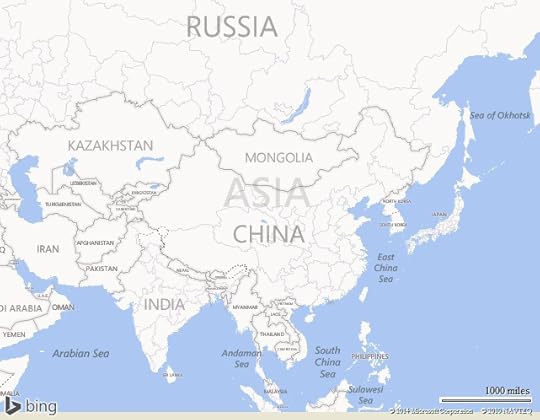
Filed under: Asia, China Tagged: 2012, 2012 Chinese New Year, 2012 Lunar New Year, Arch bridge, Asia, Beijing, Calendar, Calendar era, Calendars, Canals, CCTV, China, China photos, China statistics, China tourism, China travel, China video, Chinese, Chinese architecture, Chinese banquet, Chinese calendar, Chinese Central Television, Chinese character, Chinese culture, Chinese dinner, Chinese elements, Chinese food, Chinese language, Chinese migration, Chinese New Year, Chinese New Year Show, Chinese shopping, Chinese traditions, Chinese Zodiac, City god, Culture, Dragon, Dragon (zodiac), Earth, Eating, Feng Shui, Fire, Fireworks, Food, Four Great Classical Novels, Geography of China, Great Wall of China, Gregorian calendar, Guilin, Han Chinese, Han Dynasty, Happy New Year, hongbao, Horse, Hospitality_Recreation, Humanities, Lamb and mutton, Lunar calendar, Lunar New Year, Lunisolar calendars, Maglev, Meat, Metal, Middle Eastern cuisine, Ming Dynasty, Moon, Peony Pavilion, People's Republic of China, Pudong, Qibao, Qing Dynasty, Qingpu District Shanghai, red envelope, Religion_Belief, Restaurant, Roasting, Shaanxi, Shanghai, Shanghai Maglev Train, Shanghai Metro, Shanghai Pudong International Airport, Shanghainese, Temple, Temple of the Town Gods, The Bund, Town God's Temple, Traditional Chinese characters, Travel, Treaty of Nanking, Venice, Water, Wood, Xian, Xin Nian Kuai Le, Yangtze River Delta, Year of the Dragon, Year of the Green Horse, Year of the Horse, Year of the Wood Horse, Year of the Wooden Horse, Zhujiajiao, zodiac cycle








May 8, 2014
Celebrating New Year of the Dragon in China!
My wife Jing, son, and I spent the 2012 Chinese New Year with Jing’s family in Shanghai, China. It was a special New Year’s for us, not only because it ushered in the auspicious Year of the Dragon but also because it marked a first for our family—the first time we had been together with Jing’s family in China for the holiday. My wife had not spent New Year’s with her family in almost two decades, and it would be the first time my son and I joined them. The happy hearts and big smiles of my in-laws when we arrived January 21 foretold a joyous reunion.
Click here to read the original article on MG Edwards. Visit MG Edwards for more great travelogues, photos, and videos from around the world.
Filed under: Asia, China Tagged: 2012, 2012 Chinese New Year, 2012 Lunar New Year, Arch bridge, Asia, Beijing, Calendar, Calendar era, Calendars, Canals, CCTV, China, China photos, China travel, China video, Chinese, Chinese architecture, Chinese banquet, Chinese calendar, Chinese Central Television, Chinese character, Chinese culture, Chinese dinner, Chinese elements, Chinese food, Chinese language, Chinese migration, Chinese New Year, Chinese New Year Show, Chinese shopping, Chinese traditions, Chinese Zodiac, City god, Culture, Dragon, Dragon (zodiac), Earth, Eating, Feng Shui, Fire, Fireworks, Food, Four Great Classical Novels, Geography of China, Gregorian calendar, Han Chinese, Han Dynasty, Happy New Year, hongbao, Horse, Hospitality_Recreation, Humanities, Lamb and mutton, Lunar calendar, Lunar New Year, Lunisolar calendars, Maglev, Meat, Metal, Middle Eastern cuisine, Ming Dynasty, Moon, Peony Pavilion, People's Republic of China, Pudong, Qibao, Qing Dynasty, Qingpu District Shanghai, red envelope, Religion_Belief, Restaurant, Roasting, Shaanxi, Shanghai, Shanghai Maglev Train, Shanghai Metro, Shanghai Pudong International Airport, Shanghainese, Temple, Temple of the Town Gods, The Bund, Town God's Temple, Traditional Chinese characters, Travel, Treaty of Nanking, Venice, Water, Wood, Xin Nian Kuai Le, Yangtze River Delta, Year of the Dragon, Year of the Green Horse, Year of the Horse, Year of the Wood Horse, Year of the Wooden Horse, Zhujiajiao, zodiac cycle








May 4, 2014
Bataan Death March, Philippines (Video)
Click here to read the original article on MG Edwards. Visit MG Edwards for more great travelogues, photos, and videos from around the world.
During my 2014 trip to the Philippines, I retraced the route of the infamous Bataan Death March on the Bataan Peninsula on Luzon Island north of Manila. It was fortuitous that I followed the route on the 72nd anniversary of the March.
After the surrender of the U.S.-Filipino Bataan Defense Force during World War II to the Japanese on April 9, 1942, thousands of American and Filipino prisoners were force marched 102 kilometers from Mariveles and Bagac on the Bataan Peninsula to San Fernando in Pampanga. An estimated 60,000-80,000 Filipino and American prisoners of war endured the seven-day Bataan Death March. Those who made it to San Fernando on April 17, 1942, were loaded onto train cars by the hundreds and transferred by rail to the concentration camp at Camp O’Donell. Approximately 2,500-10,000 Filipino and 100-650 American prisoners of war died from execution, exhaustion, injury, thirst, malaria, and other causes along the way. Survivors were held prisoner until Japan’s surrender at the end of World War II in September 1945.
This video footage shows what the route of the Bataan Death March looks like today.
Route of the Bataan Death March, Philippines
No longer a dirt trail, much of it is now the Bataan Provincial Expressway. It begins at Zero Kilometer Death March Marker (Km 00) Memorial in Mariveles. A second route from Bagac, a district in the interior of Bataan Peninsula where thousands more prisoners were forced marched, merges with the Mariveles branch at Kilometer 23. The highway continues north to San Fernando with dozens of markers and memorials along the way.
The video begins at Zero Kilometer and follows the Bataan Death March route from kilometer 4 to 13. The shaky cam from an air-conditioned vehicle doesn’t convey what prisoners of war endured during the March, but it will give you a sense of the challenges they faced en route.
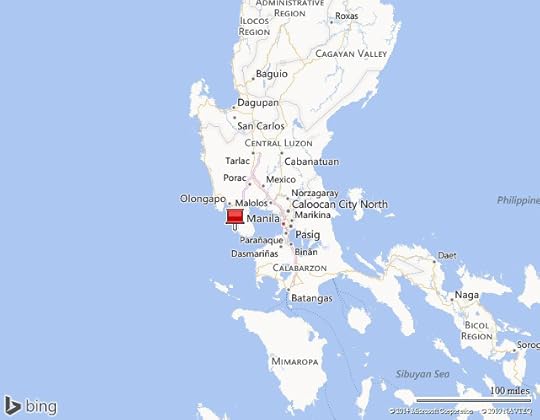
Filed under: Asia, Philippines, Video Tagged: 1942, 1942 World War II, April 1942, Armed Forces, Asia, バターン死の行進, Bagac, Balanga, Bataan, Bataan Death March, Bataan Defense Force, Bataan Peninsula, Bataan Provincial Expressway, Battle of Bataan, Batān Shi no Kōshin, Camp O'Donnell, Capas, Corregidor, crimes against humanity, Edward P. King, Filipino, Filipino resistance, forced march, General Douglas MacArthur, General MacArthur, Imperial Japan, Imperial Japanese Army, Imperial Japanese Navy, Japan, Jonathan Mayhew Wainwright IV, Luzon Island, Manila, Mariveles, Martsa ng Kamatayan sa Bataan, Masaharu Homma, military forces, Military History, Mount Mariveles, Mount Samat, Mount Samat National Shrine, Pacific Rim, Pampanga, Philippines, Philippines culture, Philippines history, Philippines independence, Philippines photos, Philippines travel, Philippines video, Philippines war memorial, prisoners of war, San Fernando, Travel, Travelogue, travelogue with photos, U.S. Army, U.S. Navy, United States, United States Armed Forces in the Far East, USAFFE, war crimes, war history, War of the Pacific, World War II, World War II battles, YouTube, YouTube video, Zero Kilometer, Zero Kilometer Death March Marker








May 2, 2014
Macau
Click here to read the original article on MG Edwards. Visit MG Edwards for more great travelogues, photos, and video from around the world.
Macau is a place of contrasts. Macau, or Macao as it was better known when it was a Portuguese colony, is officially the Macau Special Administrative Region (SAR) of the People’s Republic of China. Like its many names, the SAR is filled with more people, culture, and history than its small size suggests. Sitting on just 29.5 square kilometers (11.39 sq. miles) of land, some of it reclaimed from the Pearl River Delta, Macau has a population of more than 600,000 with a density of more than 18,500 people per square kilometer (48,000 per square mile). Although crowded, its denseness does not seem so much from its small footprint as from its rich and colorful history. The former colony still retains much of its Portuguese and indigenous Cantonese character but has grown more Chinese since its return to China in 1999. As the country’s only destination for legalized gambling, a Portuguese legacy dating back to the 1850s, Macau has become a tourist draw with its growing array of gambling and Las Vegas-style entertainment and conference venues. Nestled amid the grand casinos are neighborhoods steeped in colonial and traditional Chinese heritage. Like its sister across the delta in Hong Kong, Macau is worth highlighting as a semi-autonomous region because of its unique character and heritage.
More About Macau
Top Ten Things to Savor in Macau
A Skyline View of Macau (Video)
The Historic Center of Macau
“The House of Dancing Water” Show in Macau
Ruin of St. Paul’s Cathedral
Senado Square
A Skyline View of Macau
Taipu Village at Night
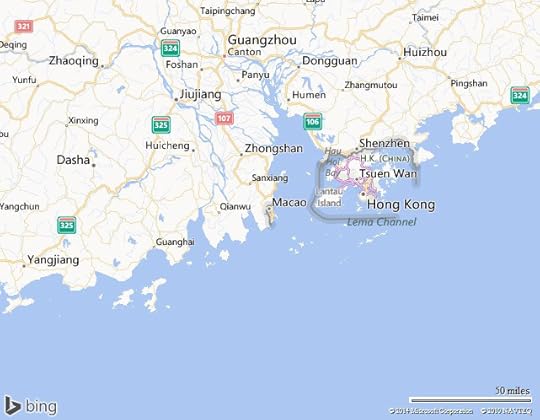
Filed under: Asia, Macau Tagged: 1999 hanover, 1999 Macau, A-Ma Temple, Ahmen, Antonio, Antonio Restaurant, Apostle Paul, Aquatic Theater, Architecture, Asia, Bacalhau, Baroque, Barra Hill, Beautiful Gardens, Buddhism, Bungee Jumping, Cannons, Cantonese, Casa Garden, Casino, Cathedral of the Nativity of Our Lady, Catholic Church, China, China travel, Cirque du Soleil, City of Dreams, Cobblestone Street, Coloane, Colonial Architecture, Colonial Government, Cotai, Cotai Strip, Cultural Center of Macau, Dance, Dark Queen, Dom Pedro V Theatre, Fernando's on Coloane, Fisherman, Fortaleza do Monte, Franco Dragone, Galaxy, Gambling, General Post Office Macau, Grand Lisboa, Guia Chapel, Guia Fortress, Guia Lighthouse, Gymnastic Artistry, High Performance Diving, Historic Center of Macau, Historic Centre of Macao, Historic Centre of Macau, Hong Kong, Hong Kong travel, House of Dancing Water, Iberian Union, IM Pei, Jesuit Reductions, Jesuits, Kuan Tai Temple, Las Vegas, Le Rêve, Lilau Square, Lou Kau Mansion, Love Statue, Macanese, Macanese Cuisine, Macao, Macau, Macau gambling, Macau Institute of Civic and Municipal Affairs, Macau Museum of Art, Macau Peninsula, Macau photos, Macau SAR, Macau Science Centre, Macau Shopping, Macau Tourism, Macau Tower, Macau Transfer of Sovereignty, Macau travel, Macau video, Mandarin's House, Military Fort, Minchi, Monuments, Moorish Barracks, Mount Fortress, Mount Hill, Museum, Museum of Macau, Na Tcha, Na Tcha Temple, O Manel, O Porto Interior, Old Protestant Church, Old Wall of Macau, Pato de Cabidela, Pearl River, Pearl River Delta, People's Republic of China, Pope Clement XIV, Portugal, Portuguese, Portuguese colony, Portuguese Empire, PRC, Princess, Rua de Santo Antonio, Rua de Sao Paulo, Ruins of St. Paul, Ruins of St. Paul's, Sam Kai Vui Kun, Sands Macau, Santa Casa de Misercordia, Senado Square, Senate Square, Sir Robert Ho Tung Library, Skywalk X, Society of Jesus, South America, Special Administrative Region of the People's Republic of China, St. Anthony's Church, St. Augustine's Church, St. Augustine's Square, St. Dominic's Church, St. Joseph's Seminary, St. Lawrence's Church, St. Paul's, Stranger, Taipa, Taipa House, Taipa Village, Taoism, The Dream, The House of Dancing Water, Theater, Travel, Travelogue, travelogue with photos, UNESCO, Venetian, Walking Tour, Water Imagery, World Heritage Site, Wynn Casino








April 27, 2014
Auckland Sky Tower, New Zealand
We spent much of the afternoon on our first day in New Zealand at the Auckland Sky Tower. The tallest free-standing structure in the Southern Hemisphere rises 328-meters (1,076 feet) over the Auckland skyline. It’s a concrete and composite structure built for Harrah’s Entertainment as part of the SKYCITY casino and event center owned by New Zealand-based SKYCITY Entertainment Group. Although the tower opened in August 1997 to some concern over its potential impact as part of the city’s first (and still only) casino, it has since become a fixture in Auckland.
Click Here to read the full article posted on my website. Visit MG Edwards for travelogues, photos and videos from around the world.
Filed under: New Zealand, Oceania Tagged: Aoraki, Aoraki Mt Cook, Aotearoa, Auckland, Auckland bridge climb, Auckland bungee, Auckland bungy, Auckland Harbour Bridge, Auckland Mt Eden, Auckland One Tree Hill, Auckland quality of life, Auckland Sky Tower, Auckland two ports, Britain New Zealand, Christchurch, Devonport, Down Under, Harrah’s Entertainment, Hauraki Gulf, Hobbiton, Kiwi, Kiwis, Lorde, Lorde New Zealand, Maori, Maori language, Maori New Zealand, Mercer ranking Auckland, Mt Eden, New Zealand, New Zealand islands, New Zealand photos, New Zealand tourism, New Zealand travel, New Zealand travelogues, New Zealand videos, New Zealand Yuletide, New Zealander, North Cape, North Island, Northland Region, northwest New Zealand, One Tree Hill, Pancake Rocks, Punakaiki, Rangitoto, Rotorua, Rotorua geyser, Sky Tower, Sky Tower glass elevator, Sky Tower glass floor, Sky Tower observation deck, Sky Tower Orbit, Sky Tower Skydeck, Sky Tower SkyJump, Sky Tower SkyWalk, Sky Tower views, SKYCITY, SKYCITY casino, SKYCITY Entertainment Group, South Island, Tasman Sea, Te Ika-a-Māui, Te Waipounamu, Waitemata Harbour, Wellington








April 23, 2014
Argentina
Click here to read the original article on MG Edwards. Visit MG Edwards for more great travelogues, photos, and video from around the world.
From the Atlantic Ocean to the top of the Andes Mountains, Argentina is a bridge between the Old and New Worlds. Innately European but distinctly Latin American, the country is a melding of cultural influences brought by the Spaniards and western immigrants and a unique geographic backdrop that offers some of earth’s most stunning scenes. Renown Argentine writer Ernesto Sabato described his homeland thus: “Because of our European roots, we deeply link the nation with the enduring values of the Old World; because of our condition of Americans we link ourselves to the rest of the continent.” One cannot sit drinking a glass of Mendoza wine in the foothills of the Andes or enjoying parrilla (grill) in the shadow of the cruise ships bound for Antarctica departing from Tierra del Fuego without thinking of Europe and the Americas. Argentines are rightly proud of their country and culture that invite visitors to indulge in and savor.
More About Argentina
Perito Moreno Glacier (Video)
Three Views of Iguazu Falls (Video)
Iguazu Falls vs. Victoria Falls (with Photos)
Ethnic Cuisine in Buenos Aires
Remembering the Falklands
Casa Rosada in Buenos Aires
Penguin and Seal Colony in the Beagle Channel, Tierra del Fuego
Llao Llao Resort and Nahuel Huapi Lake near San Carlos de Bariloche
Perito Moreno Glacier in Los Glacieres National Park

Filed under: Argentina, South America Tagged: Andes, Argentina, Argentina photos, Argentina travel, Argentina travelogue, Argentina wine, Argentine Republic, Bariloche, Buenos Aires, Ernesto Sabato, Iguazu Falls, Mendoza, Pampas, parrilla, Patagonia, República Argentina, South America, Tierra del Fuego, Travel, Travelogue, travelogue with photos, Ushuaia



















